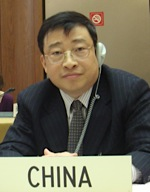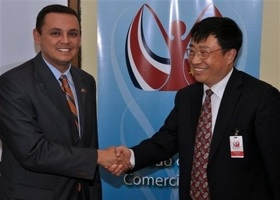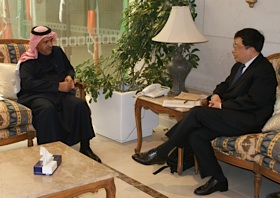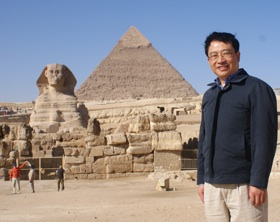 Zhu Hong, China
Zhu Hong, China
Deputy Director General, Department of International Trade and Economic Affairs, Ministry of Commerce
Transition Economy Program (’01)
You are currently Deputy Director General, Department of International Trade and Economic Affairs, of the Ministry of Commerce. In this capacity, you have been involved in many of the high-level negotiations of trade agreements between China and other countries. How did you come to work in this area and what are your main responsibilities?
My current duties as the Deputy Director General (DDG) of the Ministry of Commerce (MOFCOM) mainly concentrate on three areas:
I. Negotiating Free Trade Agreement (FTA) with other countries;
II. ODA project management, with projects covering poverty reduction, environmental protection, water conservancy, health, HIV/AIDS prevention and control, education, population, gender equity, legal system and governance;
III. Coordination and cooperation with United Nations agencies, including UNICEF, UNFPA, UNDP, UNCTAD, UNIDO, ITC and CFC etc.
After I graduated from GRIPS, I joined a competition for officials at the Deputy Director General level in my ministry and was fortunate to be appointed as DDG for international trade and economic affairs. One of the reasons for my success is that I had improved my capacity during my stay at GRIPS.
 Given the extent of China’s commercial exposure, there is intense pressure on managing its economic relations and minimizing trade frictions. What are the main challenges you face during your job as trade negotiator?
Given the extent of China’s commercial exposure, there is intense pressure on managing its economic relations and minimizing trade frictions. What are the main challenges you face during your job as trade negotiator?
The most challenging job for a negotiator is to seek consensus among different groups of people. Negotiation is an art of compromise. In order to reach an agreement I have to compromise with my counterparts. But then, domestic coordination among different line ministries, trade associations and related stakeholders is even more challenging.
During your career in the Chinese civil service, what achievement(s) are you most proud of and what has been the most rewarding aspect of your career thus far?
In the past eight years, working together with my colleagues, I successfully concluded and signed Free Trade Agreements with Pakistan, Chile, Peru and Costa Rica. I am currently the chief negotiator in the ongoing negotiations on the China – Gulf Cooperation Council (GCC) Free Trade Agreement. To reach an agreement with the six-nation Gulf Cooperation Council that is rewarding for both sides is a great challenge and a successful completion of the negotiations would definitely be a major accomplishment. Another challenge is the ongoing negotiations for the Asia-Pacific Trade Agreement (APTA), a preferential trade arrangement covering China, India, ROK, Bangladesh, Sri Lanka and Lao PDR under the coordination of UNESCAP.
 What was the most important thing you learned while at GRIPS? And how has your time in Japan influenced you in your subsequent career?
What was the most important thing you learned while at GRIPS? And how has your time in Japan influenced you in your subsequent career?
I think the most precious thing I learned from my study at GRIPS is that I improved my capacity and gained confidence to deal with different challenges.
Before I studied at GRIPS, I was mainly dealing with domestic issues in my ministry. After one year of study and training at GRIPS, I learned how to express my points in an internationally accepted way, and improved my capacity in writing papers in English as well. I received a lot of very helpful advice from Prof. Okita, my advisor in GRIPS, when preparing my paper. Armed with the knowledge I gained and thoughts I developed during my stay in GRIPS, I am full of confidence and ready to meet new challenges of different variety ahead of me.
What is your fondest memory of your time spent in Japan?
I enjoyed living and studying with students from many different countries and different cultures. It gave me a first-hand experience to share views and coexist with people from a variety of backgrounds. It has also helped me accustom to my present job.
What do you miss about Japan?
Kabuki theater, sashimi, sushi and sakura and, believe it or not, the rain. We don’t get much rain in Beijing; it is very dry.
 What is your favourite thing to do when you are not working?
What is your favourite thing to do when you are not working?
Swimming, table tennis, jogging, listening to classical music and reading.
What advice would you give to current GRIPS students?
I think that GRIPS is an ideal place to have some knowledge refreshment after you left school and had some working experience. The professors at GRIPS are quite experienced in such training courses. Japan is a fantastic place to conduct some case studies in a variety of subjects. As a well-developed country, it provides you vivid experiences and lessons to learn from on economic and social development.
My advice to current GRIPS students: First of all, enjoy your stay in Japan and try to experience Japanese culture as much as possible. Secondly, try to have some case studies between Japan and your own countries. You will have a lot of gain in both ways.




